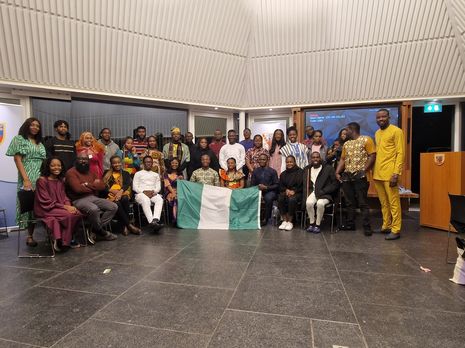“Repatriation is just one step in seeking justice” – The Cambridge University Nigerian Society on the Benin bronzes
Riannon Chaplin speaks to members of the Cambridge University Nigerian Society about creating a space to share Nigerian culture, what the Benin bronzes mean to them and why the issue surrounding them is so complex

“The society really provides a space for students to feel a link to Nigeria while they’re here,” Folakunmi Pinheiro, president of Cambridge University Nigerian Society (CUNS), tells me. He is open and friendly, and speaks passionately about the society and its impact.
It was the Museum of Archaeology and Anthropology (MAA)’s decision in December 2022 to return its looted Benin bronzes that first prompted me to sit down with Folakunmi, and fellow CUNS member, Stanley Jachike Onyemechalu. But I am also keen to learn more about the society’s work and its role in the Cambridge community.
“It provides a space for Nigerian students to feel safe at Cambridge”
In particular, the society aims to put on events for Nigerian students and those interested in Nigerian culture. One of their favourites is the Ówàńbé, a traditional party with Nigerian food, music, dancing and games, which the society hosts at the beginning of each academic year. “It helped me to step back from work,” Stanley tells me, smiling. “I could dance for the first time in a long time, to Afrobeat and Nigerian music, and ate food that tasted like home.”
It’s this sense of community and cultural connection that makes the society so valuable. “It provides a space for Nigerian students to feel safe at Cambridge, and feel like they can have a taste of Nigeria even though they are 3000 miles away,” Folakunmi adds.
He is particularly proud of the annual Democracy Day event, which celebrates the handover of power to an elected civilian government in 1999. Last year’s symposium hosted Noimot Salako-Oyedele, Deputy Governor of Ogun State and one of the few prominent female politicians in Nigeria. “It’s very uplifting for us,” Folakunmi, a PhD student in Law, continues. “The women in the group can see that there’s someone there who is striving and trailblazing.”
What was their reaction, then, to the MAA’s decision to return 116 Benin bronzes to Nigeria? “Finally!” says Stanley, and his exasperation is clear. The bronzes refer to a diverse range of thousands of objects made from brass, bronze and other materials, such as ivory, which were looted and later auctioned off after the sacking of Benin City in the Kingdom of Benin by the British in 1897. At the time, the country we now know as Nigeria did not yet exist. Their cultural, historical and spiritual significance is hard to overstate.
“Many were not supposed to be seen by people outside a specific group”
“They tell the history of the community and the kingdom,” Stanley explains. “They were a set of writings, a sort of library, with pages of objects that told stories about the most significant moments in history. Many were not supposed to be seen by people outside a specific group.”
It is hardly surprising, then, that many believe the display of the bronzes in museums across Europe and North America to be a continuation of imperial violence, of what Stanley calls the “destructive injustice” which stains colonial history. In October 2021, Jesus College, Cambridge became the first institution in the world to return a Benin bronze. Later, in September 2022, Germany agreed to return dozens of bronzes to Nigeria, and in October of that year the United States returned 31 bronzes from two institutions..
It appears there has been a shift in opinion in both academic and public spheres. The University of Aberdeen has also returned its bronzes, and Glasgow Museums and the Horniman in London have promised to do the same. Is Nigerian Culture Minister Lai Mohammed right when he says that it’s a matter of ‘when, not if’ the British Museum does the same?
“Of course,” Stanley, himself a PhD student in archaeology, tells me. But he urges caution — if there has been a change in public opinion, it has still not been enough to force the British government to act. This may be partly due to the persistence of some myths around museums’ rights over the bronzes.
Folakunmi points, for example, to the popular notion that more people will be able to see the bronzes if displayed in a national museum – the British Museum is thought to hold around 700 of them. But this, Stanley says, misunderstands the bronzes’ original purpose as objects of deep cultural and spiritual significance, never intended to be so publicly displayed thousands of miles away.
Recalling a CUNS trip to the MAA, Stanley tells me of students’ reactions to seeing the bronzes in glass cases. “You could just feel the emotions they had. What is it doing here? Why is it here? Send them back. Things like that.” Yet he believes that government red tape enables institutions such as the British Museum to hide behind the law. Here he is referring to the National Heritage Act 1983 and the British Museum Act 1963, which the museum has argued prevent it from returning such objects and which non-national and university museums are not subject to. And so the issue is swatted between government and museum without real progress, never high enough on the agenda to exert real pressure from voters. “Repatriation is just one step in seeking justice for past injustices.”
The importance of CUNS’ work in providing a safe, vibrant community couldn’t be clearer, with music, dancing and food that tastes like home. The Benin bronzes and the academic and public debates happening around them are deeply significant to the diverse Nigerian cultures the society celebrates. “It’s the Benin bronzes now,” Stanley says as we wrap up the interview, “but it could be another people’s cultural materials later.”
 News / University Council rescinds University Centre membership20 February 2026
News / University Council rescinds University Centre membership20 February 2026 News / Hundreds of Cambridge academics demand vote on fate of vet course20 February 2026
News / Hundreds of Cambridge academics demand vote on fate of vet course20 February 2026 News / Judge Business School advisor resigns over Epstein and Andrew links18 February 2026
News / Judge Business School advisor resigns over Epstein and Andrew links18 February 2026 News / Caius students fail to pass Pride flag proposal20 February 2026
News / Caius students fail to pass Pride flag proposal20 February 2026 News / Union cancels event with Sri Lankan politician after Tamil societies express ‘profound outrage’20 February 2026
News / Union cancels event with Sri Lankan politician after Tamil societies express ‘profound outrage’20 February 2026










